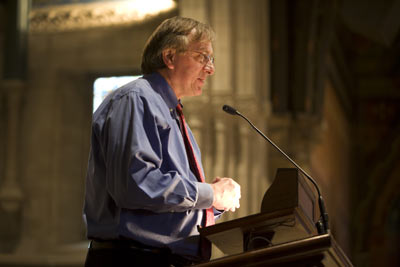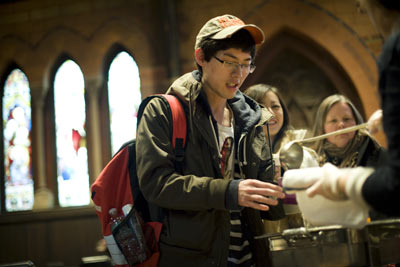Provost stresses finding hope in the small things
By Nancy Doolittle

Provost Kent Fuchs says there are two kinds of hope: hope in the present in the "small things," and hope beyond challenges and difficulties, in knowing "we are doing something that will endure."
Speaking to about 120 people at the March 1 Soup and Hope talk in Sage Chapel, Fuchs gave examples of both. Fuchs, an evangelical Christian who earned a master's degree at Trinity Evangelical Divinity School, also has a bachelor's degree in engineering from Duke and Ph.D. in electrical engineering from the University of Illinois.

Fuchs' first example related to his car, the first he had ever purchased new. When it reached more than 100,000 miles, it began needing repairs. It cost $2,000 to replace the car's rusted-in spare tire, and then the car stopped running. To fix it would take an additional $5,000, yet the car was worth only $4,500.
But then Fuchs found a local mechanic with whom he developed a personal relationship who said he could get the car running for $3,700. "I now have a new friend," Fuchs said.
Fuchs had been discouraged because he had put so much money into the car, but then became encouraged because of the mechanic's "perspective about the car, about me and about working with me."
Another example stemmed from his recent monthly meeting with three outgoing Cornell Daily Sun editors when Fuchs realized that this was their last time together. Although he would miss his relationship with them, he was encouraged by their work and sincerity and how they served not just the Sun but the Cornell community.
We can also provide hope to others when they are challenged, Fuchs said. When a discouraged department chair recently told Fuchs that he felt like resigning, Fuchs encouraged him to wait until the summer before making the decision. Fuchs later sent the chair a short email just to express his support.
Another example of hope in everyday life, Fuchs said, was in relation to an email that Fuchs received from a faculty member who is not always "lavishing compliments on the administration, including on me." After Fuchs asked him to serve in a certain capacity, the faculty member emailed back, "Dear Kent -- I would shovel manure in the Arts Quad if you asked. Of course I will serve."
These elements of caring, compassion and personal engagement add up: "Pay attention to those small gestures," Fuchs said.
To find hope in the challenges at Cornell, Fuchs said that "many generations before us … have faced the same short-term and long-term challenges that we have as individuals and even as a university," adding, "I draw encouragement and hope in the midst of small and big challenges, because we are doing something that will endure -- it's not just for us individually … but it's for the community, the university and the students."
Fuchs read from Isaiah 40 to conclude his thoughts on how he reminds himself of his connection to something larger than the current challenges: "Those who hope in the Lord will renew their strength,/ they will soar with wings like eagles,/ they will run and not be weary,/ they will walk and not faint."
Media Contact
Get Cornell news delivered right to your inbox.
Subscribe